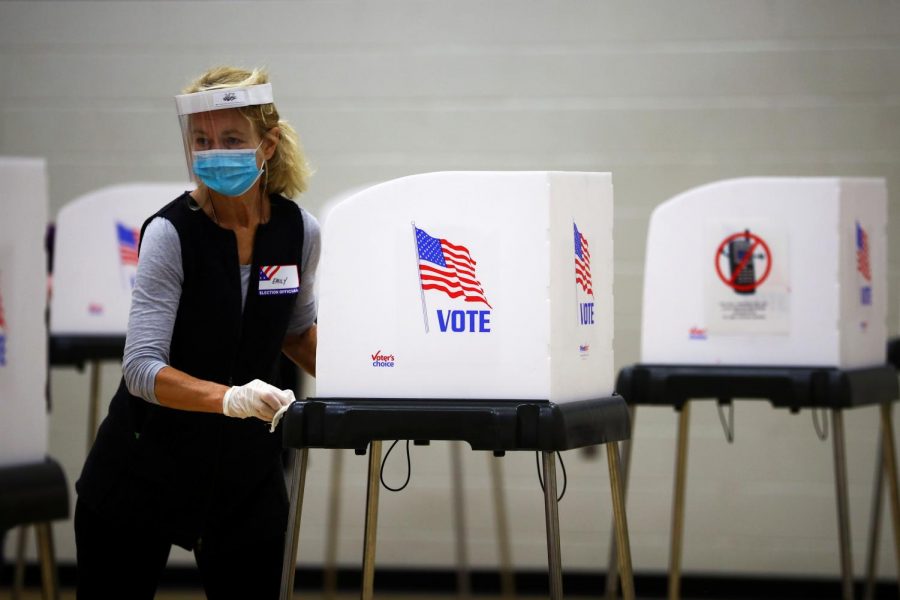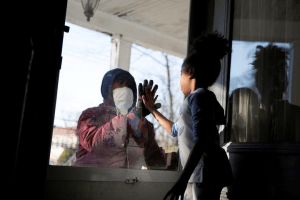2020: We Rose To The Challenge
For this year’s election, poll workers worked harder than usual to disinfect voting booths across the country, so that Americans could safely cast their vote.
February 8, 2021
Was 2020 a rough and stressful year for every single one of us? Of course. Did we face challenges we never would have imagined facing before? Absolutely. But, despite the dreadful COVID-19 pandemic, were we able to pull through, overcome, learn and grow as fellow human beings? The answer to that is a resounding and emphatic “Yes!”
Ever since it began spreading, the COVID-19 pandemic has taken far too many lives and has greatly impacted the economy. But, though it was disruptive, it did have many positive side-effects for the whole year. When lockdowns and quarantine mandates were initiated all around the world, human activity decreased significantly. Roads were mostly empty as most people were not going outside unless absolutely necessary. This trend has created many positive environmental effects, especially in urban areas. According to BBC’s Future Planet, carbon dioxide emissions decreased by 5-10% in New York City, and even up to 25% in parts of China. These conditions, with lower pollution and better air quality, provided valuable data to climate scientists. According to an article by Chemical and Engineering News, “having real-world data to confirm their predictions will […] be persuasive to policy makers”. This data will be invaluable and crucial in scientifically combating climate change, which is an extremely urgent issue; it causes hundreds of thousands of deaths annually and will keep damaging the entire planet’s ecosystems. Furthermore, this data will also help convince government officials, policy makers, and climate change skeptics of the urgency of climate change and other environmental issues.
When the COVID-19 pandemic started growing exponentially around the world, the scientific community faced an enormous challenge: creating a vaccine against the virus. Developing vaccines is an extremely complex process and historically has taken massive amounts of time, money and effort. According to Nature Research, “[before this pandemic] the fastest any vaccine had previously been developed, from viral sampling to approval, was four years, for mumps in the 1960s”. However, pharmaceutical companies Moderna and Pfizer, just months after their first human trials, announced positive results in November and got their vaccines approved by the FDA in mid-December. Before the year even ended, healthcare workers and other high-priority groups had already been administered the vaccine. This rapid development was aided by an international effort to develop vaccines, with BioNTech, a German company, working with Pfizer, and American one. Not only are these cooperatively and rapidly developed vaccines necessary to combat COVID-19, they will undoubtedly be invaluable for future vaccine developments.
As the year came to a close, the United States apprehensively waited for an important moment. The presidential election of 2020 had many obstacles in its way, including social distancing at all polling locations and massive numbers of mail-in ballots. Despite these obstacles, Americans felt motivated to do their civic duty and two-thirds of eligible voters in America cast their vote in 2020. According to The Washington Post, it was “the highest turnout since 1900, when 73.7 percent of eligible Americans cast ballots.” This election reveals a shift in politics, with the arrival of a newer generation that is more politically active and more socially aware than ever before. All in all, this year has shown us that voter turnout and awareness of the elections is bound to increase in the upcoming years, especially as conditions improve and pandemic restrictions go away.
2020 was certainly not an easy or normal year, but the lessons we learned and knowledge we gained was invaluable. Although lockdowns restricted our social gatherings and events, the unique environmental data that was collected will be crucial for climate scientists. Even during unprecedented logistical challenges, the 2020 election saw historic voter turnout, which is undoubtedly a positive sign for the future. The rapid speed and efficiency at which vaccines for COVID-19 were developed not only proved how strongly humanity can rise to the challenge, but served as an excellent foundation for future vaccines. Despite the massive challenges and curveballs that came our way in 2020, we managed to pull through together. In memory of all the lives we lost in 2020, and after all we have overcome and learned from, we hope to see a brighter world in the future.












